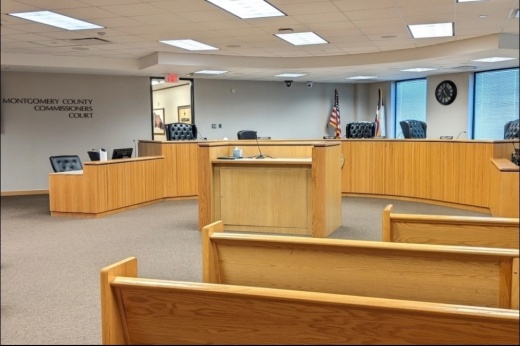During its Dec. 13 meeting, the Montgomery County Commissioners Court approved a change in the jury trial pay for court interpreters, amending it from $65 an hour to $650 per day for the first two days, according to Wendy Little, the county’s director of the office of court administration.
Following the two full days of $650 per day, pay for court interpreters goes back to $65 per hour, Little said.
“In order to get [court interpreters] to come to up here, we had to say, ‘Look, if you’re going to come to Montgomery County, we’ll at least guarantee you these first two days of trial—10 hours a day,” Little said.
Little said the jury trial pay in Harris County is $65 an hour, and, until the pay change, it did not make economic sense for court interpreters to drive to Montgomery County to receive the same pay they would in Harris County.
Prior to the pay change, Little said she had to pay several court interpreters $850 a day for trials scheduled before and after Thanksgiving.
“After I spoke with [County Judge Mark] Keough, and he approved doing the $650 per day, I had seven or eight interpreters all say, ‘For that, I’ll come north and do your trial.’”
Little said Harris County has close to a hundred interpreters living in the area, while Montgomery County has 10.
“Our 10 can’t necessarily handle our workload and all of the small surrounding counties that also need them,” Little said. “So in order to entice Harris County interpreters to drive the 45 minutes north of the freeway, we had to be able to do better than what Harris County was offering.”
Montgomery County does have one full-time court interpreter on staff, Little said.
“We also have contract interpreters come in when we know that we’re going to have more work than just one interpreter can handle,” Little said. “We have 14 judges on the bench in Montgomery County, and they all could end up needing interpreters on one day. Now, obviously, that’s rarely going to happen, but they try and send a request so we can manage how many people we need to have on any particular day.”
Little also said since county employees do not work on weekends, contract interpreters are hired to work on the weekends and county holidays.
“A court, whether it’s a criminal court or a civil court, lets us know that they have someone who has to appear before them who doesn’t speak English, and it can be any language, though obviously here in Texas, it’s primarily Spanish,” Little said. “They tell us the date and time, and how long they think they’re going to need that interpreter, whether it’s for a quick hearing, or whether or not it’s going to be a full trial that could go on for several days.”
County Judge Kathleen Hamilton, who presides over the 359th district court, said she nearly had to delay a jury trial scheduled after Thanksgiving because a court interpreter could not be available.
“It was 10 o’clock Wednesday morning before Thanksgiving when we got word that they could not find anyone who was available,” Hamilton said. “The trial was supposed to start the Monday after Thanksgiving, and that was a trial with two really serious offenses against children. It had already been reset twice because of COVID[-19] and things like that. So we did not want to do this again. And there [were] expert witnesses on both sides who would have to be rescheduled, and their schedules are hard to work with. So that didn’t happen, but it came very close.”
Hamilton said the courts balance the cases that need interpreters with those that do not need interpreters.
“We have to wait our turn, and so sometimes that means we do other cases first and just hold onto those, and when we see the interpreter come in, we usually stop whatever we’re doing as soon as we can and take that interpreter’s case first so they can scoot on their way to help somebody else,” Hamilton said. “So we do that. We’re very much aware of that as a courtesy to them and the other judges who need that person in their court.”
To qualify to be a court interpreter, people are required to complete a six-hour orientation course, pass a criminal history background check, and pass both a written and oral exam, according to the Texas Judicial Branch Certification Commission.
“The misconception is that, ‘Oh, it’s just somebody else who speaks Spanish,’” Little said. “It is a whole lot more complicated than that to be a certified interpreter for court proceedings.”
The written exam consists of 135 multiple-choice questions, while the oral exam has three parts—sight interpretation, consecutive interpretation and simultaneous interpretation—that are taken in one sitting, according to the JBCC.





